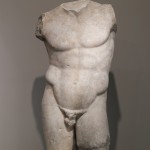I recently made two attempts to explain why I think why our subjective experience should be given as much importance in our discourse as our attempts to bracket that subjectivity in favor of the ideal of scientific objectivity. This discussion was framed in terms of the relative value of geo-centric and helio-centric perspectives on the phenomena of sunrise and sunset.
It turns out, several people have been writing about this recently and articulated themselves far better than I did.
Re-grounding global consciousness
To begin with, you must check out Elinor Predota’s post, “Aliens on our own planet? What science fiction and space exploration can teach us about our sense of place”. Elinor writes about the transformative effect of taking the wider, “objective” view, even while she acknowledges its dangers:
“It becomes possible, seeing the Earth as a whole planet, to think of the whole Earth as our home. We begin to be able to relate to, to empathise with, the Earth as one ecosystem, one Being. We begin to feel a sense of kinship with and humility in regard to all of the living beings of the earth – human and non-human – and with all of the Earth’s life-giving and life-supporting systems.
“And yet, in this expansion of cosmic consciousness, this encompassing of the whole, there is the risk of becoming ungrounded, losing our connection with actual living beings in the heady rush of Connection with Everything. In our Earth-consciousness, we become separated from the earth under our feet. […]
“One way to bridge the gap between the cosmic and the ordinary is by returning to exactly that which many of us have lost in the globalisation of awareness and culture: a sense that the world we can see, from horizon to horizon, is our place. To return to this sense, we need to explore our place, wherever that is, both as alien explorers, with genuinely open minds, eyes, ears and noses, curious and full of wonder, and as beings enmeshed in the life of the land, allowing the knowledge we gain through our openness to become embedded and embodied in us, and return to the wider life of the land through us.”
Wow! She nailed it! Elinor manages to say in 200 words what I struggled to say in 2000. We need to hold in creative tension our Earth-consciousness (our awareness of the Earth as a planet and an ecosystem) and our earth-consciousness (our experience of the ground under our feet, the dirt under under our nails, and our place within a world bounded by the horizon).
Over the past couple of weeks, other bloggers have touched on this question of distance and proximity in different ways that I want to share:
Sacred Distance and Sacred Proximity
The always articulate (not to mention prolific) Alison Leigh Lilly contrasts the subjective and objective perspectives in relation to the Romantic Movement and the Enlightenment. Alison explains that, to the Enlightenment mind of today, the problem with Romanticism is “sentimentality”, the lack of distance:
“Nothing is more important to the scientific mind than objectivity, the distance between the observer and the object being observed, which allows the observer to aspire to as unbiased a perspective as possible of the nature of things, that is, the ‘way things really are.’ […] These values clash with the Romantics’ tendency to prize individuality and originality, the uniqueness of every person’s own subjective experiences as unlike anyone else’s and valuable in their own right, whether they can be verified or not.
“The problem is that this desire for distance and objectivity collapses in the other direction. If sentimentality is the lack of distance, then objectivity can err on the side of too much distance. For instance, science has a tendency to think about love in terms of affinity and attraction, ascribing its effects to chemicals in the brain and the bloodstream, and it takes no real interest in the subjective experiences of the objects that it studies. This reductionist view has had some bizarre consequences that have actually kept scientists from being able to understand ‘the way things really are.’ […]
“This is why the Romantics themselves were so skeptical and distrustful of the rationalistic mindset of their day, which they thought reduced the world (and the human beings in it) to mindless, mechanistic processes that could be harnessed and manipulated according to the whims of those in power. […] When we shy away from acknowledging the subjectivity of others, we make it easier to think of ourselves as the only ones who really matter, reducing everyone and everything else around us to utilitarian means to our own ends.”
Alison concludes that those of us who practice some form of nature spirituality must seek a balance between sacred distance and sacred proximity, a balance that Alison finds in the experience of the paradox of love, that relationship that both unites and differentiates, requiring us seek union even while we honor the space that separates us.
“The lesson is, once again, one of dynamic balance between contradictory ideas — a kind of sacred paradox. We can work to bring art and science, romanticism and rationalism, into conversation with each other. We can understand our relationship with the natural world as characterized by both emotion and intellect, intimacy and mystery, union and separation. We can appreciate the knowledge that science gives us while also acknowledging the subjectivity and individuality of beings vastly different from ourselves.”
The Goddess and objectivity
Meanwhile, over at Theapoetics, Molly Remer discusses “Objectivity and Personal Experience” in the context of Goddess spirituality. If you’re not familiar with the difference between theology (with an “o”) with thealogy (with an “a”), the latter is not about just swapping a male God with a female one; it’s about “break[ing] the power of the patriarchal symbol of God as male over the psyche” (Carol Christ). Theology is an expression of patriarchy, and the male God is its central symbol.
Remer explains that theology is an attempt to study God objectively. But thealogy declares this enterprise to be bankrupt. In theology, God is something you believe in; but in thealogy, Goddess is something you experience. The purpose of the feminine imagery of Goddess is not to describe the attributes of divinity as an object, a mental construct, but to free us from old mental constructs so we can experience divinity subjectively, as a bodily experience.
Molly quotes Merlin Stone:
“[F]eminists concerned with Goddess spirituality have seldom offered absolute or pat answers to theological questions. What has been happening is the experiencing, and at times the reporting, of these personal or group experiences: how it feels to regard the ultimate life force in our own image—as females; how it feels to openly embrace and to share our own contemplations and intuitive knowledge about the role of women on this planet; how it feels to gain a sense of direction, a motivating energy, a strength, a courage—somehow intuited as coming from a cosmic female energy force that fuels and refuels us in our struggle against all human oppression and planetary destruction.”
This is thealogy, at least as I understand it.
But if we are to seek a balance between the objective and subjective, then it seems to me there must be a place for the male God in thealogy. Anne Kent Rush writes “For a feminist, or for any woman, to perpetuate a patriarchal religion and to worship a male god is for her to deify her oppression.” I can understand the need for an exclusive worship of Goddess to act as a counterbalance to the millennia of patriarchal consciousness. However, while it may be a means to an end, it cannot be the end. If the central symbol of Goddess is wholeness (Molly calls discovery of Goddess “cosmologically wholesome”), in contrast to the dividing and distinguishing activity which characterizing the Abrahamic God, then it seems to me that Goddess consciousness must somehow include the objective perspective.
Cosmologically speaking, we might say that the patriarchal God is the son of (as well as the consort of) the parthenogenic Goddess. In Starhawk’s words:
“The Goddess is the Encircler, the Ground of Being; the God is That-Which-Is-Brought-Forth, her mirror image, her other pole. She is the earth; He is the grain. She is the all encompassing sky; He is the sun, her fireball. She is the Wheel; He is the traveler. He is the sacrifice of life to death that life may go on. She is the Mother and Destroyer; He is all that is born and is destroyed.”
In cosmological terms, patriarchal consciousness occurs when the God denies his connection to Goddess which is his Source. Jungian John Dourley defines “patriarchal consciousness” as
“every form of consciousness which prefers to remain within itself, to rely exclusively on its rational powers and willful energies and, so, to refuse the invitation of the Goddess to death and renewal in a life-long process with which the ego can and must co-operate but never control.”
This refusal to re-enter the “womb/tomb” of Goddess is manifest in the patriarchal myths of those gods and heroes who refuse the call of the goddess, like Gilgamesh and Cuchuclain, as well as the Gnostic myth of the Demiurge who forgets his origin in his mother Sophia and imagines himself to be the creator of the cosmos.
A Goddess spirituality which denies any place for the God (even an ontologically inferior place) is just reversing the patriarchal error. A thealogy which lives up to that name must, I think, make room for the patriarchal God, albeit in a relativized form. Such a thealogy might, for example, places the plenary Goddess above the divided male Trinity. In so doing finds a place for the subjective experience of objective consciousness, an objectivity-within-subjectivity, reversing the traditional ordering, which places objectivity on a higher order which purports to include our subjectivity.
Re-enchantment through embodiment
Last but not least, there is a wonderful 2-part series on re-enchantment by Traci over at her new blog, A Sense of Place. In part 1, “Enchantment: the story of disconnection in our modern world”, Traci lays the foundation for part 2, giving a pretty standard account of how we lost our sense of place and became “disenchanted”: to facilitate a scientific understanding of the world, humankind sought to separate itself from nature, to step “outside” of natural phenomena and become observers of the world as an object. This became not just a scientific method, but our ordinary, everyday consciousness where, as Traci explains, “everything is an object, alien, not-me; and I am ultimately an object too, an alienated “thing” in a world of other, equally meaningless ‘things.'” The result is psychological, social, and environmental illness. While stating that she is not devaluing science, Traci emphasizes that “scientific consciousness is alienated consciousness” and it is no way for human beings to live.
Too many discussions of disenchantment ends there, bemoaning our current state. But in part 2, “Enchantment: Coming back to our Selves”, Traci gets down to the nuts and bolts of the re-enchantment project. Traci writes that the key to re-enchantment is “our bodies, our somatic experience of the world–of our Selves as part of that world”. She distinguishes genuine somatic experience from the “secondary satisfactions” of television, video games, drugs, consumerism, and so on.
“We have inherited a civilization in which the things that really matter in human life exist at the margin of culture. And it is at this margin, at the hedge, so to speak, that we begin our (re)enchantment. For here, we are at a crossroad, and any choice we make will altar us. For now, we must ask ourselves: “What matters?”
Traci offers the following list:
- How birthing takes place matters.
- How infants are raised matters.
- Having a rich and varied dream life matters.
- All living persons (human or Other) matter.
- Ontological security matters.
- The magic of personal interaction and healthy and passionate sexual expression matter.
(That’s a great list!)
These are macro-issues, but Traci argues that they can only be resolved on a micro-level. Only by putting away our technology and closing our books, and then going outside, sitting still in silence and listening, can we re-experience our embodiment. And only then will our culture will begin to heal itself of its disenchantment.
Traci writes that she “had gotten caught up in macro-issues, which have their place, but they take me out of my body–out of the micro.”
“There is a paradox in the dance between macro and micro; between modernity and holism; between the pain of division and the joy of dissolution. As human-persons we move between Wild and Tame; between Self and Other. So, it is in holding the tension of Paradox, in allowing our Selves to be still and listen–understanding what matters, that we experience Enchantment.”
The relationship between the micro and macro is an issue Molly Remer discusses on a recent post at the Feminism and Religion blog entitled “Do Women’s Circles Actually Matter”, where she concludes that institutional change begins with small circles of women coming together in the “radical and subversive” act of honoring their embodied experience.
The importance of the body to bridging the gap between subjective and objective is something that I’ve alluded to before here:
“It seems to me that, if I am to discover how to meld these two practices [Self-centric practice and earth-centered practice], there is one place where I may find the answer: my body. The body is the place where our subjective experience and objective reality meet. It is the place where psyche meets nature, where inner and outer meet and mingle, where ‘me’ blends imperceptibly into the ‘other’. I believe it is through my ‘body-self’ that I may discover and connect the ‘gods within’ (the archetypes of the unconscious) and the ‘gods without’ (the immensities of nature).”
Final Thoughts
Here’s my take away from all of this:
1. There is a paradox to the “Overview Effect”: when we expand our perspective above our immediate and local (i.e., subjective) situation, then we perceive both ourselves and the earth in a way that is more ecologically-aware (i.e., objective); but we run the risk of becoming disconnected from the ground on which we stand, losing paradoxically our place in the world.
2. In our experience of the natural world we can hold both sacred proximity and sacred distance in creative tension. We can seek union while still honoring the space that separates us.
3. Theaologically, this experience can be expressed in terms of a Goddess which includes the patriarchal God, and an account of subjective experience which makes a place for objective consciousness.
4. The revaluation of subjective experience is the re-echantment of the world. And locus of the experience of the re-enchantment is our bodies, the place where the subjective and objective meet. And its the sharing of this experience in small groups that can foster the transformation of consciousness that will heal the world.















